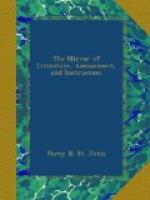[3] Chamber’s Dict v. Antony.
* * * * *
SONG
Written in imitation of COWLEY’S mistress.
(For the Mirror.)
Oh, where didst borrow that last
sigh,
And that relenting groan;
Ladies that sigh and not for love,
Usurp what’s not their own.
Love’s arrows sooner armour
pierce
Than that soft snowy skin;
Thine eyes can only teach us love,
They cannot take it in.
J.H.L.H.[4]
[4] Yes—if confined to Anecdotes.—Ed. M.
* * * * *
RETROSPECTIVE GLEANINGS
THE GROANING TREE OF BADDESLEY, HAMPSHIRE.
(For the Mirror.)
Gilpin, in his “Remarks on Forest Scenery,” says, A cottager, who lived near the centre of the village, heard frequently a strange noise behind his house, like that of a person in extreme agony. Soon after, it caught the attention of his wife who was then confined to her bed. She was a timorous woman, and being greatly alarmed, her husband endeavoured to persuade her that the noise she heard was only the bellowing of the stags in the forest. By degrees, however, the neighbours on all sides heard it, and the circumstance began to be much talked of. It was by this time plainly discovered that the groaning noise proceeded from an Elm, which grew at the bottom of the garden. It was a young, vigorous tree, and, to all appearance, perfectly sound. In a few weeks the fame of the groaning tree was spread far and wide; and people from all parts flocked to hear it. Among others it attracted the curiosity of the late Prince and Princess of Wales, who resided at that time, for the advantage of a sea-bath, at Pilewell, within a quarter of a mile of the groaning tree.
Though the country people assigned many superstitious causes for this strange phenomenon, the naturalist could assign no physical one, that was in any degree satisfactory. Some thought it was owing to the twisting and friction of the roots: others thought that it proceeded from water, which had collected in the body of the tree; or, perhaps, from pent air: but the cause that was alleged appeared unequal to the effect. In the mean time, the tree did not always groan; sometimes disappointing its visitants; yet no cause could be assigned for its temporary cessations, either from seasons, or weather. If any difference was observed, it was thought to groan least when the weather was wet, and most when it was clear and frosty; but the sound at all times seemed to come from the roots.




